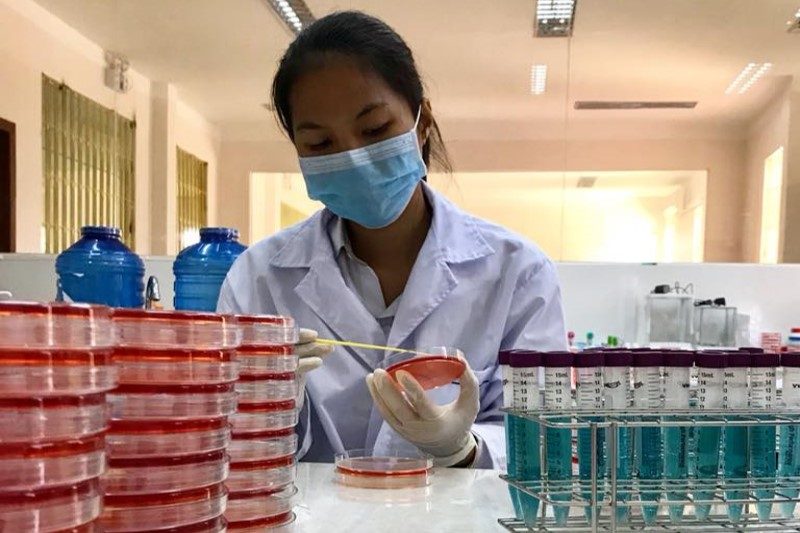
The first challenge faced by the Feed the Future Innovation Lab for Food Safety’s inaugural project in Cambodia was not one they expected – how to maintain momentum in the face of the coronavirus pandemic and international lockdowns. In response, the Kansas State University–Purdue University–Royal University of Agriculture (RUA) partnership fast-tracked the building of Cambodian food safety expertise and research capacity.
“The partnership that we have with RUA is so critical to our success,” said Jessie Vipham, co-principal investigator (PI) and assistant professor of animal sciences and industry at Kansas State University. “If there is a silver lining to the pandemic’s disruption of our project, it’s that by pivoting to greater reliance on the researchers at the RUA, Cambodia is developing greater capacity in research that benefits public health and nutrition.”
Before the lockdown, the team completed a preliminary assessment of bacterial contamination on vegetables in distribution centers. The centers are essential infrastructure in Cambodia’s food system, connecting vendors with produce to sell to consumers in the country’s ubiquitous open-air markets, but they are also possible sources for cross-contamination. In previous work funded by USAID, Vipham and collaborator Lyda Hok, director of the Center of Excellence on Sustainable Agricultural Intensification and Nutrition (CE SAIN), documented high levels of pathogenic bacteria on vegetables in fresh food markets found in two provinces, Siem Reap and Battambang.
“Food systems are complex, and it is difficult to control foodborne pathogens at all levels, so you need to identify the locations that contribute the most to people coming into contact with a foodborne pathogen,” said Vipham. “This project will enable us to focus on areas where changes in practices can lead to a measurable reduction in the risk of contamination of vegetables that reach the consumers.”
While the team is awaiting final confirmation of results, preliminary data suggest that bacterial contamination was high within the distribution centers, with some seasonal fluctuation. To reduce contamination in downstream markets, distribution centers are a priority for food safety interventions.
“Food safety interventions involve changing behaviors, and behavior changes are generally driven by awareness of the impact of an action,” said Paul Ebner, project co-PI and professor of animal sciences at Purdue. “To design effective interventions, we need a handle on current perceptions of food safety, so we can target those gaps to build greater awareness or greater acceptance for food safety practices.”
When the pandemic prevented Ebner’s team from traveling to Cambodia to lead the survey work, the development of the survey was converted into an experiential learning opportunity in survey design for Hok’s team, culminating in their official third-party certification to conduct research with human subjects.
“As part of the new training, we were able to add a pilot study and validate and revise the survey, and so the process made the survey much more robust,” Ebner said. “We’ve been able to continue working successfully through the pandemic, and it’s entirely because of existing strong relationships between Feed the Future Innovation Labs and the Royal University of Agriculture.”
Amanda Garris is a communications specialist with the Feed the Future Innovation Lab for Food Safety.

